-
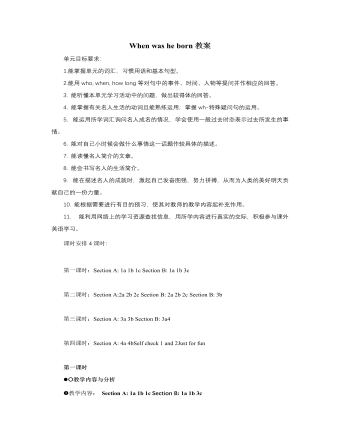
人教版新目标初中英语八年级上册When was he born教案
1.能掌握单元的词汇,习惯用语和基本句型。2.能用who, when, how long等对句中的事件、时间、人物等提问并作相应的回答。3. 能听懂本单元学习活动中的问题,做出较得体的回答。4. 能掌握有关名人生活的动词且能熟练运用;掌握wh-特殊疑问句的运用。5. 能运用所学词汇询问名人成名的情况,学会使用一般过去时态表示过去所发生的事情。 6. 能对自己小时候会做什么事情这一话题作较具体的描述。7. 能读懂名人简介的文章。8. 能会书写名人的生活简介。9. 能在描述名人的成就时,激起自己发奋图强,努力拼搏,从而为人类的美好明天贡献自己的一份力量。10. 能根据需要进行有目的预习,使其对教师的教学内容起补充作用。11. 能利用网络上的学习资源查找信息,用所学内容进行真实的交际,积极参与课外英语学习。课时安排4课时:第一课时:Section A: 1a 1b 1c Section B: 1a 1b 3c第二课时:Section A:2a 2b 2c Section B: 2a 2b 2c Section B: 3b
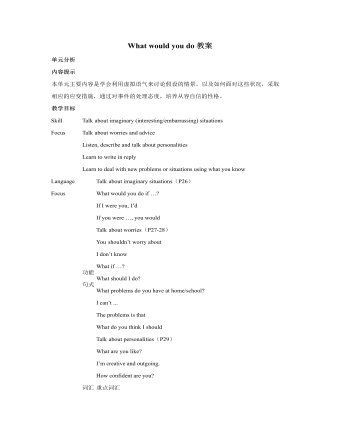
人教版新目标初中英语九年级上册What would you do教案
本课采用任务型教学法,用What would you do if you had a million dollars?这个问句,引出谈论假想情况的话题。 采用提问、启发和归纳的教法,让学生易于接受教材内容,培养学生的语言运用能力。 四、 教学过程设计 Step Ⅰ. Greet the whole class as usual. Step Ⅱ. Warming-up T: Do you have ten Yuan in your pocket? S1: No, I don’t. T: (Take out ten Yuan and give it to the student) OK, never mind. What would you do if it was yours? What would you do if you had ten Yuan? S1: I would buy snacks. T: OK, thank you. Sit down, please. (To the whole class) Just now, it was only ten Yuan. What about 100 Yuan? What would you doif you had 100 Yuan? S2: I’d buy a beautiful jacket. T: Thank you. (To the whole class) Now suppose you had a million dollars, what would you do? We know thatone dollar nearly equals eight Yuan, so that’s a large sum of money. Think it over carefully and tellme your ideas. What would you do if you had a million dollars? S3: I’d buy a big house. S4: I’d buy a sports car. S5: I’d put it in the bank. T: OK, stop here. Please look at the blackboard and guess what would I do if I had a million
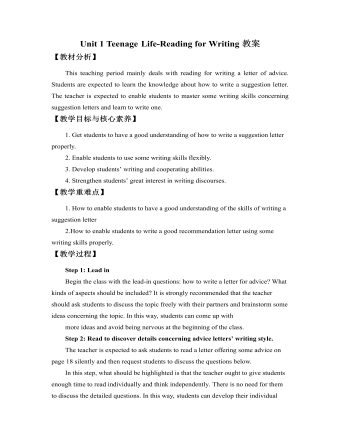
新人教版高中英语必修1Unit 1 Teenage Life-Reading for Writing教案
【教材分析】This teaching period mainly deals with reading for writing a letter of advice. Students are expected to learn the knowledge about how to write a suggestion letter. The teacher is expected to enable students to master some writing skills concerning suggestion letters and learn to write one.【教学目标与核心素养】1. Get students to have a good understanding of how to write a suggestion letter properly.2. Enable students to use some writing skills flexibly.3. Develop students’ writing and cooperating abilities.4. Strengthen students’ great interest in writing discourses.【教学重难点】1. How to enable students to have a good understanding of the skills of writing a suggestion letter2.How to enable students to write a good recommendation letter using some writing skills properly.【教学过程】Step 1: Lead in Begin the class with the lead-in questions: how to write a letter for advice? What kinds of aspects should be included? It is strongly recommended that the teacher should ask students to discuss the topic freely with their partners and brainstorm some ideas concerning the topic. In this way, students can come up with more ideas and avoid being nervous at the beginning of the class.Step 2: Read to discover details concerning advice letters’ writing style.The teacher is expected to ask students to read a letter offering some advice on page 18 silently and then request students to discuss the questions below.
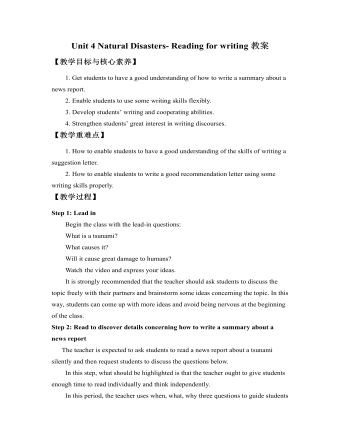
新人教版高中英语必修1Unit 4 Natural Disasters- Reading for writing教案
①标题——标题应当简洁明了。②导语——导语是消息开头的第一段或第一句话,简明扼要地揭示出消息的核心内容。③主体——主体是消息的主要部分,要用充足的事实表现主题,对导语的内容作进一步的展开和阐述。④结束语——通常是对全文内容进行概括性的总结。3. 新闻报道增分句子(1)陈述事实常用的句型:①A terrible storm hit/struck ... , killing ..②It was a cool autumn night when the earthquake happened. A large number of buildings fell down and roads were destroyed, leaving a great many people homeless.地震发生在一个凉爽的秋夜。大量的建筑物倒塌,道路被毁,许多人无家可归。③With the help of the rescue team, people who were the trapped in the flood were saved.在救援队的帮助下,困在洪水中的人们得救了。(2)陈述观点常用的句型:①Clearly/Obviously/In my opinion/It seemed that people were shocked.显然/在我看来/似乎人们震惊了。②The whole city was in ruins after the earthquake.地震后整个城市成了一片废墟。(3)揭示原因常用的句型:Because of/As a result of/Thanks to the help of the army, people who got injured were sent to the hospital immediately.

新人教版高中英语必修2Unit 1 Cultural Heritage-Discovering Useful Structure教案二
This theme of the part is “ Describe people or things in greater detail”. Students have learned the grammar(restrictive relative clauses) in Book 1, and further review and consolidate its structure “prep+relative pronouns(which/whom)” and the relative adverbs(when, where and why), besides students should understand its form, meaning and functions. In this section, students should be able to express the grammar correctly in daily communication and in the writing. 1. Review the basic usages of relative pronouns and adverbs of attributive clauses . 2. Learn to use some special cases about restrictive relative clauses.3. Learn to write sentences with restrictive relative clauses flexibly according to the context.1. Review the basic usages of relative pronouns and adverbs of attributive clauses .2. Learn to use some special cases about restrictive relative clauses.3. Learn tow rite sentences with restrictive relative clauses flexibly according to the context.Step 1. Observe the following sentences, and mark the relative pronouns and the adverbs. 1. After listening to the scientists who had studied the problems, and citizens who lived near the dam, the government turned to the United Nations for help.2. Temples and other cultural sites were taken down piece by piece, and then moved and put back together again in a place where they were safe from the water.Step 2 PracticePlease complete these sentences with relative pronouns and relative adverbs and answer the following questions.Questions: 1. What is the head noun ?2. What relative words should be used ?3. What elements do they act in these sentences ?

新人教版高中英语必修2Unit 4 History and Traditions-Listening&Speaking&Talking教案二
Listening and Speaking introduces the topic of “Take part in a youth project”. The listening text is an interview about "sharing views on historical sites". Through listening to a dialogue between Chinese and foreign students on the way to the Confucius Temple, students can understand their views on the Confucius Temple, Confucius, Confucius' descendants and Confucius' educational thoughts, so as to realize and think about the profound influence of Confucius and his thoughts on Chinese historical tradition. At the same time, the dialogue naturally integrates English idioms and mentions Shakespeare, the British playwright, so as to provide language materials and context for students to understand English idioms and related cultural allusions, as well as to compare Chinese and foreign cultures, which is helpful for students to understand and express the language such as history, tradition, culture and custom significant impact.Text analysis: listening text is a dialogue between a British student and a Chinese student when he goes to the Confucius Temple. When William, a British student, visited the Confucius Temple, he asked Xiao Kong, a Chinese student, for directions. Xiao Kong was just going to the Confucius Temple to meet with the members of the research group, so they went together and exchanged their views on the Confucius Temple, Confucius, Confucius' descendants and Confucius' educational thoughts. From the perspective of foreign tourists, this paper describes their thoughts on Confucius, the great son of Confucius, who had a profound impact on Chinese history and cultural tradition, and his education.Listening and Talking introduces a visit to a historic tourist destination. Tourism is a common way to understand a country's history, culture, and customs and so on. Students listen to the dialogue between Xiao Yan, a youth hostel Usher, and Paul, a backpacker, to learn about Pingyao's famous historical and cultural attractions and Paul's travel experience and experience as a foreign tourist.

新人教版高中英语必修2Unit 5 Music-Listening and Speaking教案
This lesson is about music. Students can classify the types of music through the instruments and its sound and can talk about their preferences about music, even join some activities and play a role in them according to their musical talents. On the basis, they are guided to use the languages to express their preferences and some plosive sounds and their rules.1. Classify the music types through the instruments and its sound.2. Listen and understand what the speakers’ preferences are and the reasons; talk about their own preferences and give their own reasons, using these sentences: “What kind of music do you like? And why? “ “Because it makes/gives me energy/peaceful.../touches my heart...”.3. Learn some plosives and the rules.4. Join some activities and play a role in them according to the talents. 1. Listen and understand what the speakers’ preferences are and the reasons;2. talk about their own preferences and give their own reasons, using these sentences: “What kind of music do you like? And why? “ “Because it makes/gives me energy/peaceful.../touches my heart...”.3. Learn some plosives and incomplete plosives and its rules.Step 1 Lead inPoint at the pictures on P50 and ask Q1: What are the people doing in the pictures below?Q2: What kind of music they are?Then play the MP3s one by oneStep 2 ListeningTask 1: A reporter from the school newspaper is interviewing students about music. Listen to the interviews. Draw lines between the words to make complete sentences. Some words will not be used.
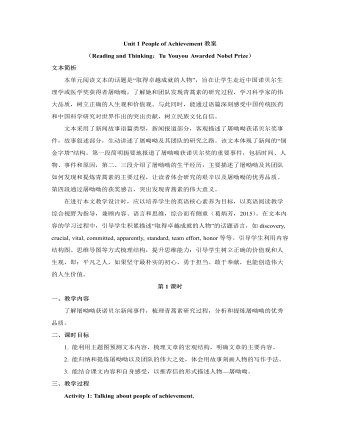
新人教版高中英语选修1Unit 1 People of Achievement教案
【设计意图】 基于上述分析,学生总结新闻故事语篇类型的特征,即标题的省略性、导语的概括性、数据的支撑性和引语的重要性。在此过程中,学生对新闻故事语篇类型有了更深层次的了解,对于学生阅读和写作具有重要意义。Activity 7: Discussing to make a writing outline.本活动为实现课时目标3。1.Discuss and make an outline.Ask students to discuss in groups of four and make their own writing outline.To celebrate the 70th anniversary of the People’s Republic of China, our school newspaper starts a new column about “People of Achievement”. You plan to write a news story about one of the winners of the Medal of the Republic in 2019, including Yu Min, Shen Jilan, Sun Jiadong, Li Yannian, Zhang Fuqing, Yuan Longping, Huang Xuhua and Tu Youyou.【设计意图】 教师创设情境,即为庆祝新中国成立70周年,校报新增有关卓有成就人物的栏目,你将从共和国勋章获得者中,选择一位写一篇新闻故事,向该栏目投稿。学生以小组合作形式,展开讨论,并写出新闻故事框架,有助于学生课后收集人物信息,撰写新闻故事。
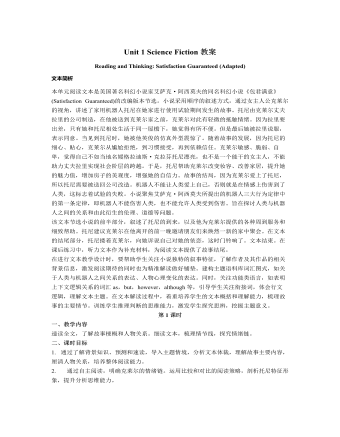
新人教版高中英语选修4Unit 1 Science Fiction教案
本活动旨在落实课时教学目标2。 1.Think, discuss and share. Students form groups of 4, discuss about the given ending make comments. Q1: Do you like the ending? Q2: Was it a logical ending? Why so or why not? [设计意图]通过引导学生思考、讨论、评价,比较个人、同伴所预测的结局和听力文本所给定的结局的异同点,深化对文本的认知,发展学生的评判性思维能力。 Activity 4: Exploring Asimov’s three laws of robotics and the purpose of the writing 本活动旨在落实课时教学目标3。 1. Get to know Isaac Asimov’s three laws of robotics. The teacher shares Isaac Asimov’s three laws of robotics. The three laws state that: ①A robot may not injure a human being or, through inaction, allow a human being to come to harm. ②A robot must obey any orders given to it by human beings, except where such orders would conflict with the First Law. ③A robot must protect its own existence as long as such protection does not conflict with the First or Second Law. Q: How does Tony’s story relate to the laws? 2. Figure out Isaac Asimov’s purpose of writing Satisfaction Guaranteed. The students express their opinions about the author’s writing purpose. Q: Why did Isaac Asimov write such a story? S: To explore the relationship between robots and humans. [设计意图]通过了解艾萨克·阿西莫夫所制定的机器人三大定律,加深学生对文本的理解,深入探究文本的主题意义。推理作者的写作目的,联系生活实际,思考人类与机器人的关系。
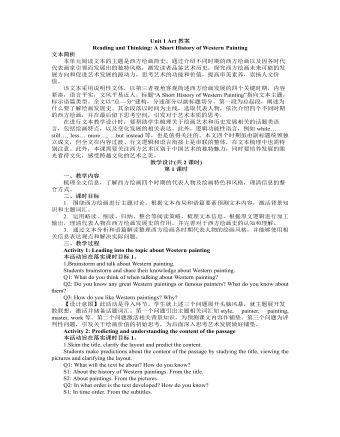
新人教版高中英语选修3Unit 1 Art教案
[2] An important breakthrough…was… [3] Another innovation was … [4] the emphasis increasingly shifted from…to… [5] New ideas and values gradually replaced… [6] While his paintings still had religious themes… … T: All these expressions serve to show how Western painting has developed. Some of them share similar structure but with varied use of words, which makes the text vivid and more readable. 【设计意图】主题类语言整理有助于学生类化语言应用,提高语言输出的丰富性。处理完文本内容信息后,进入语篇信息处理,进行主题相关的词块归类。引导学生快速阅读,寻找表达相同主题(发展或者艺术)的词和短语,再根据词性、用法和结构进行归类,储备主题相关词汇,丰富语言储备,提升语言素养。 Assignment: Go online to gather more information about Chinese painting and write a short history of it. 【设计意图】结合所学,迁移运用,根据实际语境,进行模仿性运用。在此过程中,学生尝试借鉴已学的语言、内容、语篇结构和写作手法来建构新文本,实现语篇输出,同时关注中西艺术文化的差别,加深对优秀文化的认同,培养文化意识。
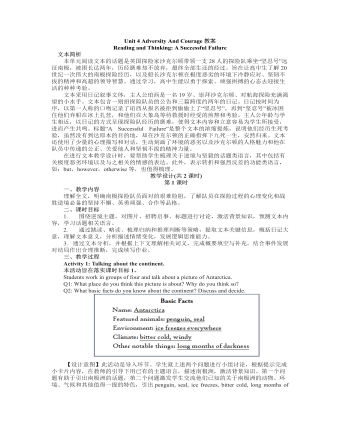
新人教版高中英语选修3Unit 4 Adversity And Courage教案
本活动旨在落实课时目标3。 The Student Union is looking for three students for a 3-week voluntary program in Guizhou province. The volunteers have got to be high school students, with a persevering personality and experiences in overcoming adversity. The volunteers need to stay, eat and teach with 20 pupils in a small school up on the hill of a village. There are no facilities but desks and a blackboard in the school. And there is no take-away food to be bought anywhere; the only way to feed yourself is to cook. You’re interested in applying. Write your application letter introducing what adversity you have ever overcome and how persevering you are as well as what you want to do when at work. Dear Student Union,【设计意图】此任务旨在迁移一、二课时所学,解决实际问题。学生对比自己经历过的挑战或挫折,写信给学生会申请前往贵州担任短期支教教师,把个人以前是怎么战胜挫折的经过书写出来。结合所学,迁移创新,分析解决自身实际问题,在真实情境中学生通过仿写进行主题语言的精确输出。完成任务的过程中,能较多地使用已学语言、内容、结构和写作手法来描述自己面对挫折的处理方式、态度和应有的品质,近一步激发学生树立正确的价值观,学会逆境出人才,坚忍不拔,从容不迫,又做到谦让、分享和合作。课后学生修正习作,再次提交。
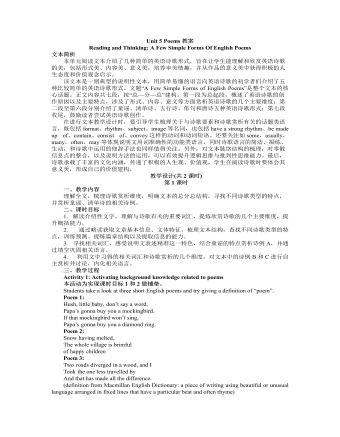
新人教版高中英语选修3Unit 5 Poems教案
本单元阅读文本介绍了几种简单的英语诗歌形式,旨在让学生能理解和欣赏英语诗歌的美,包括形式美、内容美、意义美,培养审美情趣,并从作品的意义美中获得积极的人生态度和价值观念启示。 该文本是一则典型的说明性文本,用简单易懂的语言向英语诗歌的初学者们介绍了五种比较简单的英语诗歌形式。文题“A Few Simple Forms of English Poems”是整个文本的核心话题。正文内容共七段,按“总—分—总”建构。第一段为总起段,概述了英语诗歌的创作原因以及主要特点,涉及了形式、内容、意义等方面赏析英语诗歌的几个主要维度;第二段至第六段分别介绍了童谣、清单诗、五行诗、俳句和唐诗五种英语诗歌形式;第七段收尾,鼓励读者尝试英语诗歌创作。 在进行文本教学设计时,要引导学生梳理关于与诗歌要素和诗歌赏析有关的话题类语言,既包括format、rhythm、subject、image等名词,也包括have a strong rhythm、be made up of、contain、consist of、convey这样的动词和动词短语。
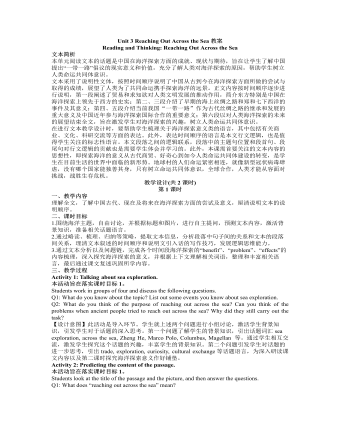
新人教版高中英语选修4Unit 3 Reaching Out Across the Sea教案
本活动旨在落实课时目标3。 Think about the following questions and talk about your own attitude in pairs.Q1: As for this topic,what impresses you the most in the passage?Q2: What do you think of the future of China’s further exploration in sea? Are you in favor of the further exploration?Why or why not? 【设计意图】该活动是一个完全开放性的活动,每个学生都会有不同的答案。运用迁移所学,自由口头表达自己对海洋探索的态度。对于中国海洋探索的未来,每个人的想法是不一样的,有乐观,有担忧,有认为值得投入,也有认为不值得付出太大代价,这里给学生自由表达的空间只要学会有支撑自己观点的事实就可以了,进一步培养学生批判性思维和正确的价值观。 Assignment: 此任务旨在迁移一、二课时所学,培养学生辩证分析问题的能力。 Write about your idea of the future of China’s sea exploration. And add your attitude towards the effort China have made in sea exploration. You’re expected to use the language and the writing technique learnt in the passage.
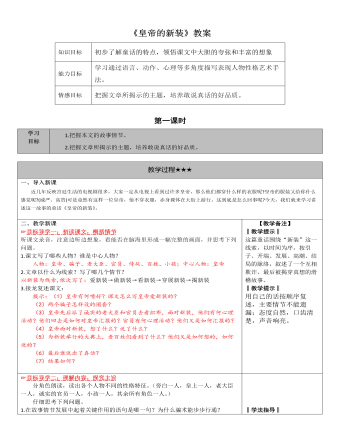
部编版语文七年级上册《皇帝的新装》教案
仔细思考下列问题。1.在故事情节发展中起着关键作用的语句是哪一句?为什么骗术能步步行通?(1)“任何不称职的或者愚蠢得不可救药的人,都看不见这衣服”这句话在故事情节发展中起着关键作用。(2)骗子胡说那件衣服具有一种“奇怪的特性”,不但抓住了皇帝的昏庸无能而又想辨别出官员是否称职、是聪明还是愚蠢的心理,而且抓住了大臣们只想保住官位而阿谀奉承的心理,因而骗术步步行通。2.在根本不存在的“新装”面前,从皇帝到老百姓都不敢说自己根本看不见它,这是为什么?因为骗子说“任何不称职的或者愚蠢得不可救药的人,都看不见这衣服”,大臣们怕人说自己不称职,百姓怕人说自己愚蠢,皇帝既怕被人说不称职,又怕给人说愚蠢,所以都不敢说真话了。3.后来,一个小孩子最先说出了真话,紧接着老百姓也都说真话了,而皇帝和他的内臣们仍装模作样地把戏演下去。作者这样写,你是怎样理解的?
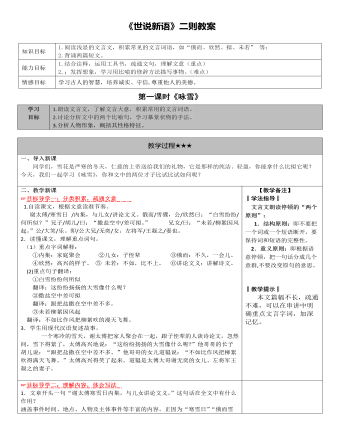
部编版语文七年级上册《世说新语》二则教案
?目标导学二:理解内容,体会写法 1.文章开头一句“谢太傅寒雪日内集,与儿女讲论文义。”这句话在全文中有什么作用? 涵盖事件时间、地点、人物及主体事件等丰富的内容。正因为“寒雪日”“俄而雪骤”,才能引出“咏雪。2.“寒雪”“内集”“欣然”“大笑”’等词语营造了一种怎样的家庭氛围?营造了一种融洽、欢快、轻松的家庭氛围。3.“咏雪”的过程中,文章特别记载了两个人的咏,即用“撒盐空中”和“柳絮因风起”来比拟“大雪纷纷”,你对其中哪一个更欣赏?为什么?“柳絮因风起”更好,因为柳絮比盐更像雪。给人以春天即将到来的感觉,意蕴强,有美感,这是“撒盐空中”所缺乏的。“撒盐空中”比喻了雪的颜色。 4.文章结尾交待了谢道韫的身份,有什么用意?谢太傅对两人的答案未做评定,只是“大笑乐”而已,十分耐人寻味。作者也没有表态,却在最后补充了道韫的身份,这是一个有力的暗示,表明他赞赏道韫的才气。
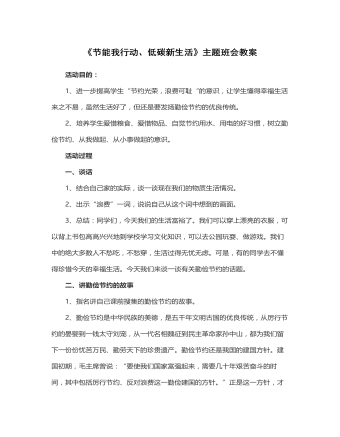
《节能我行动、低碳新生活》主题班会教案
二、讲勤俭节约的故事1、指名讲自己课前搜集的勤俭节约的故事。2、勤俭节约是中华民族的美德,是五千年文明古国的优良传统,从厉行节约的晏婴到一钱太守刘宠,从一代名相魏征到民主革命家孙中山,都为我们留下一份份忧苦万民、勤劳天下的珍贵遗产。勤俭节约还是我国的建国方针。建国初期,毛主席曾说:“要使我们国家富强起来,需要几十年艰苦奋斗的时间,其中包括厉行节约、反对浪费这一勤俭建国的方针。”正是这一方针,才使我们年轻的共和国医治了几十年战争的创伤,甩掉一穷二白的帽子,屹立干世界民族之林老一辈无产阶级革命家鞠躬尽瘁、艰苦朴素的光辉事迹,更是彪炳千秋,中华民族正是具有这种精神,才能生生不息,不断繁衍。可是,经过我们班同学调查发现我们学校在这方面仍存在着一些不好的'现象,现在请同学展示一下你们课前调查的浪费现象。
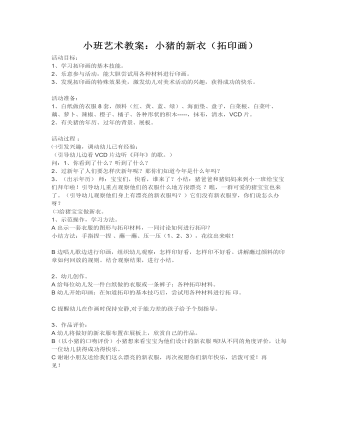
小班艺术教案:小猪的新衣(拓印画)
活动准备: 1、白纸做的衣服8套,颜料(红、黄、蓝、绿)、海面垫、盘子,白菜根、白菜叶、藕、萝卜、辣椒、橙子、橘子、各种形状的积木-----,抹布,清水,VCD片。 2、有关猪的年历、过年的背景、展板。 活动过程 : ㈠引发兴趣,调动幼儿已有经验: (引导幼儿边看VCD片边听《拜年》的歌。) 问:1、你看到了什么?听到了什么? 2、过新年了人们要怎样庆新年呢?那你们知道今年是什么年吗? 3、(出示年历) 师:宝宝们,快看,谁来了?小结:猪爸爸和猪妈妈来到小一班给宝宝们拜年啦!引导幼儿重点观察他们的衣服什么地方很漂亮 ?瞧,一群可爱的猪宝宝也来了。(引导幼儿观察他们身上有漂亮的新衣服吗?)它们没有新衣服穿,你们说怎么办呀?
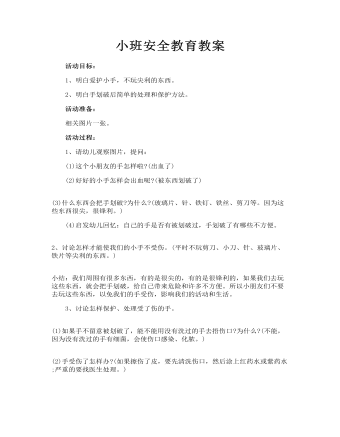
小班安全教育教案
活动过程: 1、请幼儿观察图片,提问: (1)这个小朋友的手怎样啦?(出血了) (2)好好的小手怎样会出血呢?(被东西划破了) (3)什么东西会把手划破?为什么?(玻璃片、针、铁钉、铁丝、剪刀等。因为这些东西很尖,很锋利。) (4)启发幼儿回忆:自己的手是否有被划破过,手划破了有哪些不方便。 2、讨论怎样才能使我们的小手不受伤。(平时不玩剪刀、小刀、针、玻璃片、铁片等尖利的东西。)
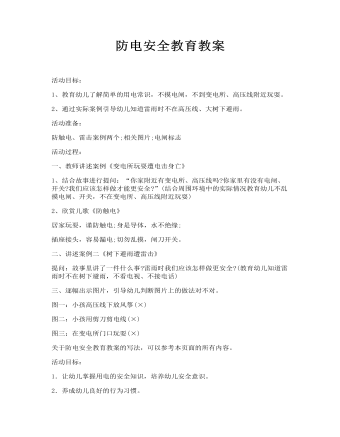
防电安全教育教案
一、教师讲述案例《变电所玩耍遭电击身亡》1、结合故事进行提问:“你家附近有变电所、高压线吗?你家里有没有电闸、开关?我们应该怎样做才能更安全?”(结合周围环境中的实际情况教育幼儿不乱摸电闸、开关,不在变电所、高压线附近玩耍)2、欣赏儿歌《防触电》居家玩耍,谨防触电;身是导体,水不绝缘;插座接头,容易漏电;切勿乱摸,闸刀开关。

防拐骗安全教育教案
二、展开活动1、引导幼儿讨论:豆豆迷路了,他怎么做的?这样会出现什么后果?并说一说如果自己遇到了这样情况时应采取怎样的做法,引导幼儿明白遇事要动脑筋。2、幼儿展开讨论,说出自己的看法,并进行简单记录,教师将幼儿的记录进行整理、张贴、以提高幼儿自我保护意识。3、开展“有奖竟猜”游戏,可将幼儿分为男女两方,提问问题,幼儿迅速且较完整的说出想法,答对的一方可奖一朵小红花。